

The Maker Educator Workshop. I am doing full day workshops on The Maker Educator both at ISTE 2016 and EduTECH in Australia.
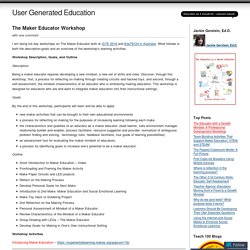
What follows is both the description-goals and an overview of the workshop’s learning activities. Workshop Description, Goals, and Outline Description. The Mindset of the Maker Educator. Educator as a Maker Educator. Educators as Lead Learners. I have discussed educators as model learners before: The educator’s role has or should change in this age of information abundance or Education 2.0-3.0.
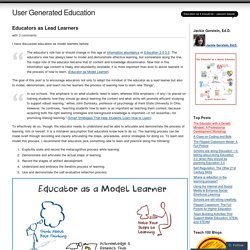
The educator’s role has always been to model and demonstrate effective learning, but somewhere along the line, the major role of the educator became that of content and knowledge disseminator. Capture the Learning: Crafting the Maker Mindset. You've heard some good stuff about the maker movement such as how making helps students learn through embodied cognition, creates a mindset that's empowering, and builds creative confidence.
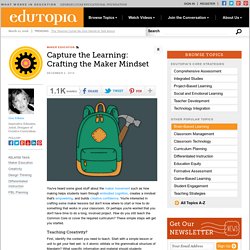
You're interested in crafting some maker lessons but don't know where to start or how to do something that works in your classroom. Or perhaps you're worried that you don't have time to do a long, involved project. How do you still teach the Common Core or cover the required curriculum? These simple steps will get you started. Teaching Creativity? Innovation Mindset = Growth + Maker + Team Experiences - Getting Smart by Tom Vander Ark - 21st century skills, academic mindest, deeper learning, education, Innovation, leadership.
What do young people need to know and be able to do be successful?
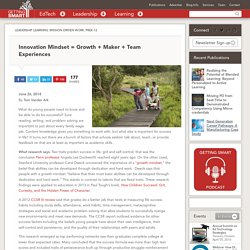
Sure reading, writing, and problem solving are important to just about every family wage job. Content knowledge gives you something to work with, but what else is important for success in life? It turns out there are a bunch of factors that schools seldom talk about, teach, or provide feedback on that are at least as important as academic skills. What research says. Two traits predict success in life: grit and self-control; that was the conclusion Penn professor Angela Lee Duckworth reached eight years ago.
A 2012 CCSR lit review said that grades do a better job than tests at measuring life success habits including study skills, attendance, work habits, time management, metacognitive strategies and social and academic problem solving that allow students to successfully mange new environments and meet new demands. Beyond growth. The Maker Mindset: Albemarle County Public Schools & Maker Corps. By Chad Ratliff and Pam Moran, District Administrators, Albemarle County Public Schools (Charlottesville, VA) A few weeks ago, some of our young people reminded us that “making” is a mindset that can occur any time, any place.
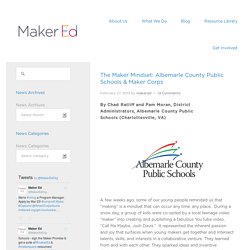
During a snow day, a group of kids were co-opted by a local teenage video “maker” into creating and publishing a fabulous YouTube video, “Call Me Maybe, Josh Davis.” It represented the inherent passion and joy that surfaces when young makers get together and intersect talents, skills, and interests in a collaborative venture. They learned from and with each other. They sparked ideas and inventive thinking. Creativity Lab – Making in School. Fun fact: here at the Creativity Lab, Making isn’t just about making things.
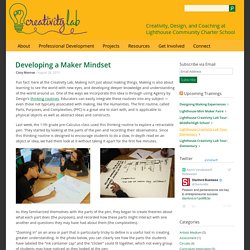
Making is also about learning to see the world with new eyes, and developing deeper knowledge and understanding of the world around us. One of the ways we incorporate this idea is through using Agency by Design’s thinking routines. Educators can easily integrate these routines into any subject — even those not typically associated with making, like the Humanities. The first routine, called Parts, Purposes, and Complexities, (PPC) is a great one to start with, and is applicable to physical objects as well as abstract ideas and constructs. Last week, the 11th grade pre-Calculus class used this thinking routine to explore a retractable pen. The Maker Mindset » Stir-fried Science. Written by Dr Kiruthika Ramanathan, Senior Manager, Education Services & Outreach at Science Centre Singapore.
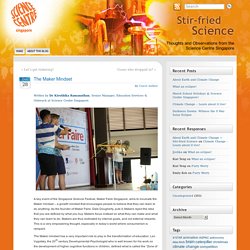
A key event of the Singapore Science Festival, Maker Faire Singapore, aims to inculcate the Maker mindset – a growth mindset that encourages people to believe that they can learn to do anything. As the founder of Maker Faire, Dale Dougherty, puts it, Makers reject the idea that you are defined by what you buy. Makers focus instead on what they can make and what they can learn to do. Makers are thus motivated by internal goals, and not external rewards. Makers Of The World: Engaging Kids Through Building and Design. Edutopia. Educator as Lead Learner: Learning LittleBits.
I have discussed educators as model learners before: The educator’s role has or should change in this age of information abundance or Education 2.0-3.0.
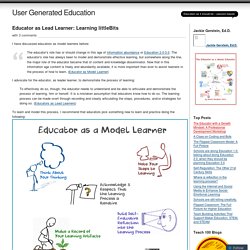
The educator’s role has always been to model and demonstrate effective learning, but somewhere along the line, the major role of the educator became that of content and knowledge disseminator. Now that in this information age content is freely and abundantly available, it is more important than ever to assist learners in the process of how to learn. (Educator as Model Learner) Learning About Young Makers. I am a huge proponent of using hands-on, interactive learning activities to explore ill-defined problems as a way of teaching for all age groups.
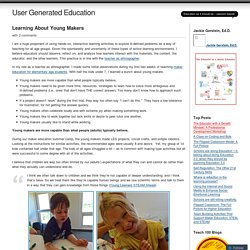
Given the spontaneity and uncertainty of these types of active learning environments, I believe educators should observe, reflect on, and analyze how learners interact with the materials, the content, the educator, and the other learners. This practice is in line with the teacher as ethnographer. In my role as a teacher as ethnographer, I made some initial observations during my first two weeks of teaching maker education for elementary age students.
With half the kids under 7, I learned a bunch about young makers. Young makers are more capable than what people typically believe.Young makers need to be given more time, resources, strategies to learn how to solve more ambiguous and ill-defined problems (i.e., ones that don’t have THE correct answer). Young makers are more capable than what people (adults) typically believe. How the Maker Movement Is Transforming Education. How the Maker Movement is Transforming Education By Sylvia Libow Martinez and Gary S.
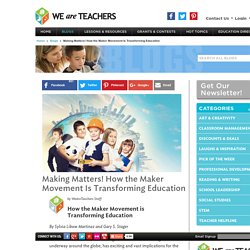
Stager. The Educator as a Maker Educator: the eBook. I compiled all of my blog posts about Maker Education into an ebook that I published via Amazon Kindle. The price is $3.99. YouTube - Broadcast Yourself. Connecting Makerspaces to Authentic Learning. I love the idea of making, inventing and tinkering. Just watch kids who are immersed in the activities and you can see the engagement. But is the learning authentic and relevant? I presented three sessions at the Free Maker Movement event at One Work Place on Wednesday, September 30, 2015 with some amazing educators who presented hands-on activities.
The event will took place at our Oakland Center for Active Learning . I decided I needed to spend some time researching where the Maker Movement was happening and find examples of authentic learning. I read Jackie Gerstein‘s post: MAKE STEAM: Giving Maker Education Some Context where she wrote “recent discussions with other educators and administrators made me realize that the idea of maker education is often vague and seems unrealistic in terms of regular classroom instruction.” @jackiegerstein. Reflecting on the Making Process. My background is in experiential education.
One of the strategies used in experiential education is debriefing or reflecting on the experience. In other words, learning from direct experience is not left to chance. The educator becomes proactive in debriefing or processing the experiences to increase the chances that learning occurs. Reflecting on Becoming a Maker Educator. As I wrap up my work for CEP811, a course focused on the Maker Movement and adapting innovative technologies to education, I took time to reflect on all of the different projects I have worked on over the past seven weeks.
Project-Based Learning Through a Maker's Lens. The rise of the Maker has been one of the most exciting educational trends of the past few years. MakerSpace Reflections #makered #ctedu. On Tuesday, I’m participating as a moderator and discussion-group leader with the Connecticut Education group on Twitter, talking about MakerSpaces in schools. That’s on Twitter from 8:00pm to 8:30pm (eastern time), on Tuesday 28 July 2015, on the #ctedu hashtag. Maker Education - About Maker Education. Making MAKEing More Inclusive. Update/Addendum: Last evening I traveled to Albuquerque with a friend to see the makerspace there and attend their monthly meeting. Bridge to the Future: Creating Maker Mindsets in Girls. Inspiring the Next Generation of Makers. Karen Cator is President & CEO of Digital Promise. You can follow her on Twitter at @kcator. 9 Maker Projects for Beginner Maker Ed Teachers. Maker education (often referred to as “Maker Ed”) is a new school of educational thought that focuses on delivering constructivist, project-based learning curriculum and instructional units to students.
Maker education spaces can be as large as full high school workshops with high-tech tools, or as small and low-tech as one corner of an elementary classroom. From Makerspace to Makerspaces: School-Wide Integration of a Maker Mindset. If you asked me to define a makerspace at the start of the school year, I would have told you it was a room - most likely in a high school - where a 3D printer was lorded over by the building’s resident tech guru.